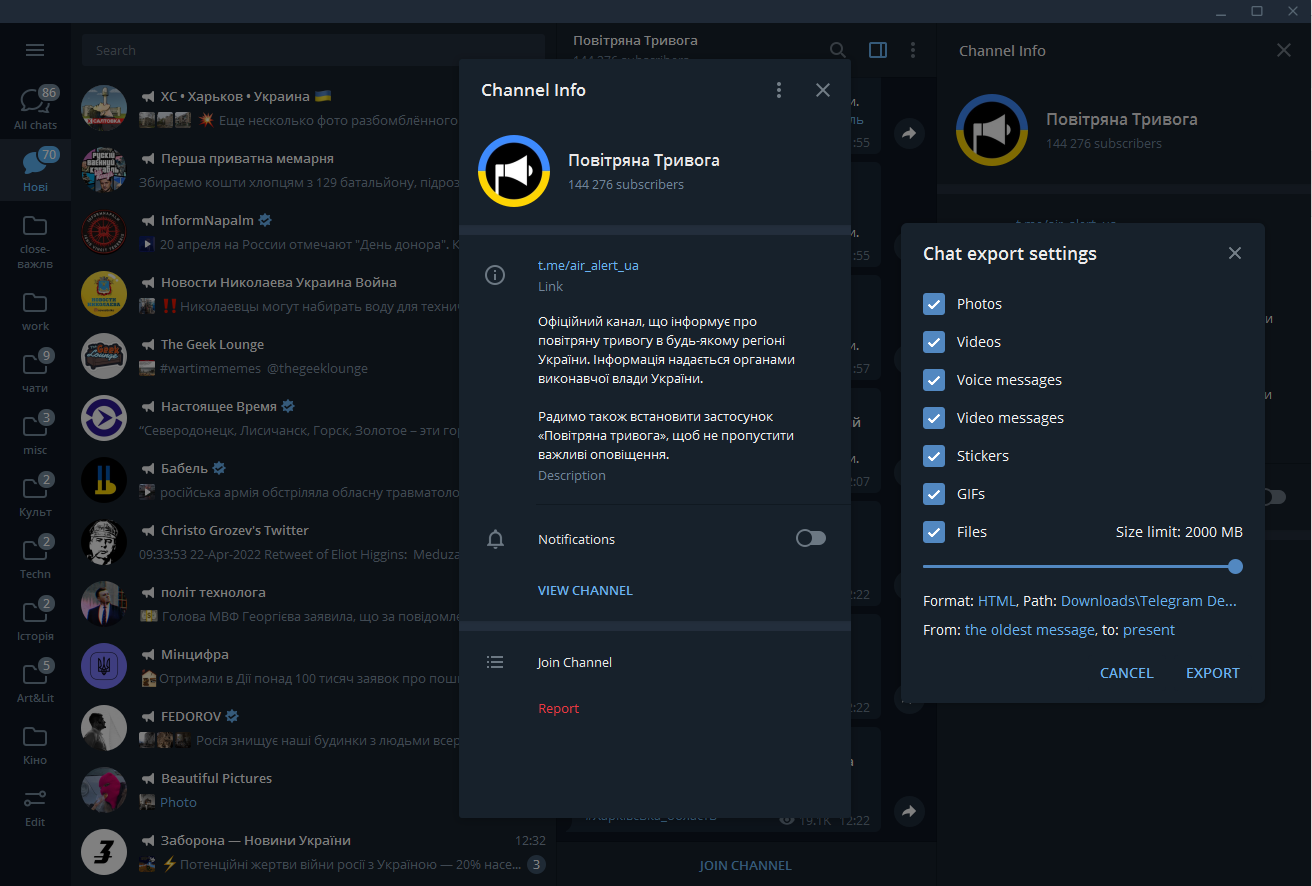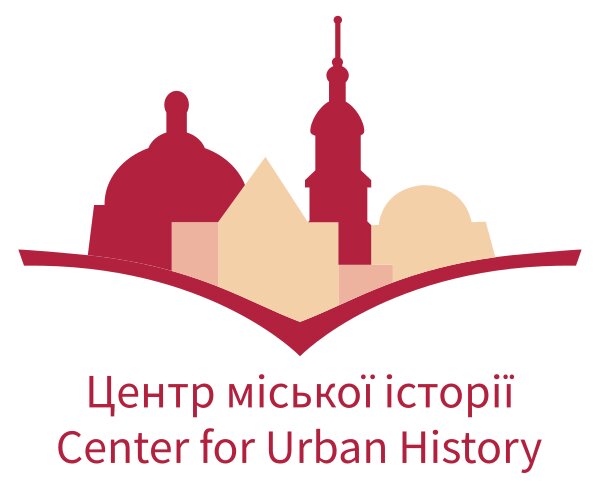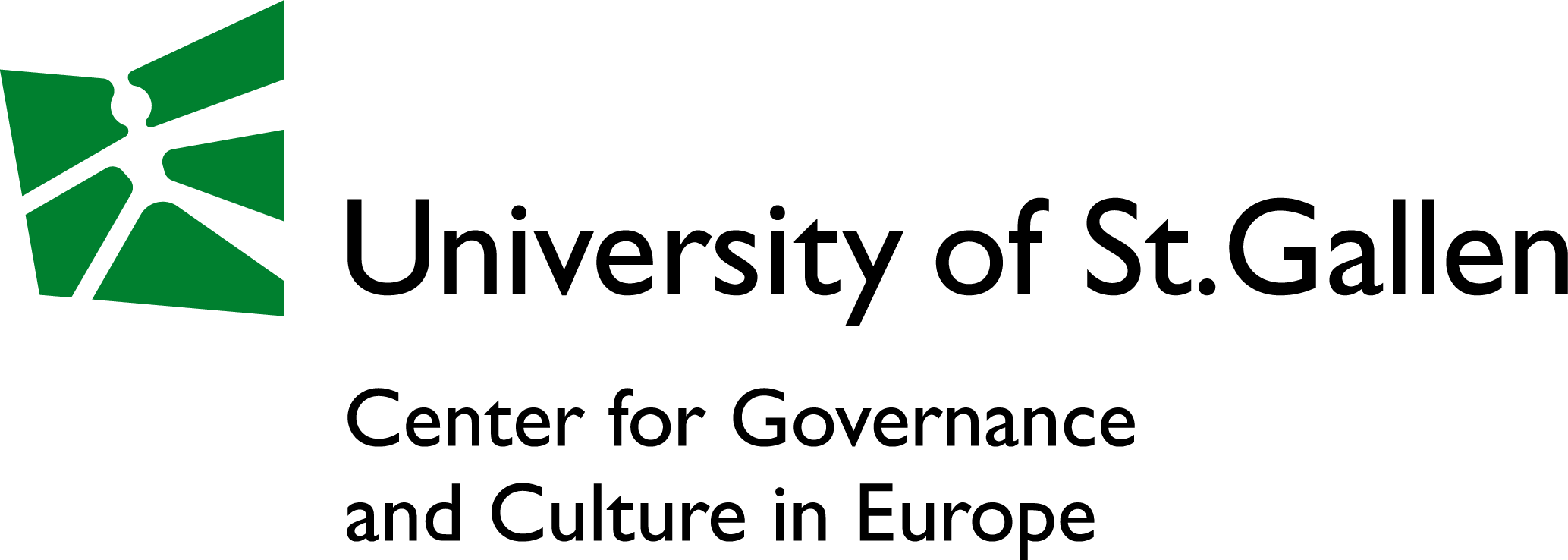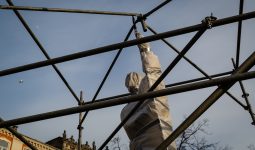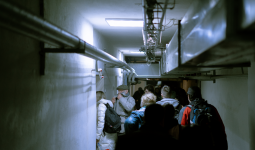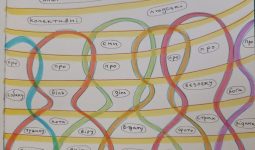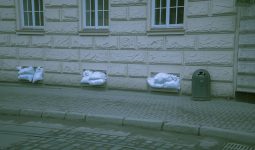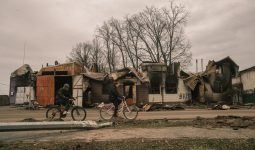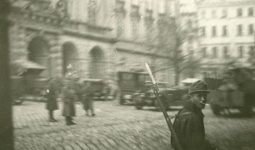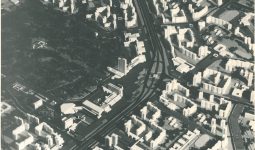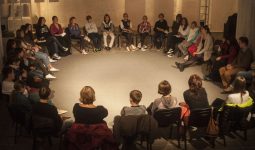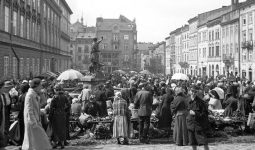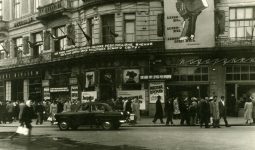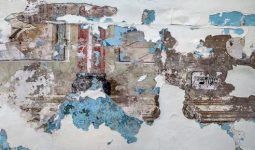Telegram Archive of the War
March 2022 – present
We document how Ukrainians learn, live, and share testimonies about the war through Telegram. This emergency archiving aims to collect and organize information flows that may quickly disappear due to their short-lived digital nature. We are preparing an archive that will help us talk about war when we can talk about it in the past tense.
We store on our servers streams of messages and audiovisual content from mainly Ukrainian channels and chats published since February 24, 2022. After processing and structuring the materials, an archival collection about the war will be created and published.
WHAT DOES THE ARCHIVE INCLUDE?
It includes almost everything (although, of course, not everything). The range of archived channels and chats is extensive: local and all-Ukrainian volunteer groups for the coordination of humanitarian assistance, evacuation chats, housing search, reporting on missing persons, reporting about air-raid alerts, urban channels and local problems in the areas of hostilities and the occupied territories, personal diaries, blogs and artistic reflections, humour and memes, expert analytics, documenting the course of hostilities and destruction, political communities, messages of local and central authorities, armed forces, media, as well as Russian government propaganda and pro-Russian channels and chats.
The Telegram not only reflects the course of the war — but there are also ongoing hostilities waging here. From the first days of the invasion, a chatbot was created on this platform to inform the Armed Forces about Russian military positions. In addition, Belarusian activists regularly monitor the actions of the Russian military in Belarus and report air attacks on Ukraine. On the other hand, Telegram is actively used for information and propaganda campaigns, as well as for the coordination of cyberattacks and the publication of acquired databases and personal information.
Our archive records all text and voice messages, images, audio, video and other types of files. We are already archiving around 1000 channels and chats. The total amount of data reaches about four terabytes and grows.
Despite the broad framework, our focus areas do change. We stopped archiving some channels and assigned low archiving priority to others. We keep adding new thematic focuses. The main emphasis is on local and industry-specific channels and chats that allow you to see the information landscape from the residents' perspective and go beyond the understanding of war as armed hostilities or official and journalistic messages only.
You can read more about the project here: [Telegram Archive of the War].
The full report on the two years of the initiative's work is available via the link: [Two year project report].
THE PROJECT TEAM
All participants in this archival project, except for the staff of the Center for Urban History, come from the previously occupied territories or were forced to leave their homes with the beginning of the full-scale Russian invasion. Their professional backgrounds come from historical disciplines, journalism, and media communications. For security reasons, we have decided not to tell you more about them for now.
Project curator: Taras Nazaruk, archive coordinator, head of digital history projects at the Center for Urban History, doctoral student at FernUniversität in Hagen.
- Oksana Avramenko is a historian and graphic designer. Her participation in the archive began with the creation of a selection of channels and chats from the temporarily occupied Crimea. Later, her interests focused on socially vulnerable categories of the population (IDPs, refugees) and human rights protection during the war.
- Anna Rubanska is a journalist. Her areas of interest include Ukrainian refugees abroad, media, marketing, channels and chats of military units as a means of conducting information warfare.
- Dmytro Serbulov is a historian who started his cooperation with the archive by creating a collection of chats and channels from the south of Ukraine, but later expanded his interests to other topics (religion, ecology, animals).
Participated in archiving at the early stages:
- Roksolyana Holovata is a historian, editor of the Interactive Lviv project at the Center for Urban History, and a graduate student at the Ukrainian Catholic University and the University of Wroclaw. She has been involved in archiving some Telegram channels and websites.
- Oleksandr Kud' is a journalist, writer, and musician. He started working with the Archive in March 2022, but later mobilized to the Armed Forces of Ukraine. He contributed to the formation of collections of chats from Kharkiv region and propaganda channels for the audience of Southern Ukraine.
- Karina Lazaruk is a graphic designer and researcher. She joined the archive in March 2022 and was engaged in archiving Russian propaganda and disinformation. Her participation in the archive grew into cooperation with scholars from UvA and INC, and the results of the collaboration were cited in Politico and published in Theory on Demand #44.
- Serhii Pakhomenko is a historian, associate professor of international relations and foreign policy at Mariupol State University. During his fellowship at the Center for Urban History in May-September 2022, he archived channels and chats about Mariupol.
PARTNERS AND SUPPORT
We extend our gratitude for the direct and indirect support, valuable advice, and guidance from individuals including Oleksii Chebotarov (University of Vienna, University of St.Gallen), Miglė Bareikytė (European University Viadrina Frankfurt (Oder), Jarden Skop, Alexander Martin (University of Siegen), Mykola Makhortykh and Ani Baghumyan (University of Bern), Niels Brügger (Aarhus University, NetLab), Jeff Deutch (Mnemonic), Sarah Day Thomson (University of Edinburgh), Anders Klindt Myrvoll (Netarkivet), Olga Holownia and members of the International Internet Preservation Consortium, Sebastian Majstorovic and the SUCHO initiative, Marcin Wilkowski (Center Kompetencji Cyfrowych UW), Geert Lovink (Institute of Network Cultures), Marc Tuters, Stijn Peeters (Digital Methods Initiative, University of Amsterdam), Maciej Maryl (Centrum Humanistyki Cyfrowej Instytutu Badań Literackich PAN), Maria Drabczyk (Centrum Cyfrowe), Ad Pollé (Europeana), Valérie Schafer, Lars Wieneke (C2DH, University of Luxembourg), Anton Mishchuk, Maksym Demydenko (War Archive, Infoscope), Serhii Movchan (UHHRU), Yevhen Vorozheikin (National Pedagogical Drahomanov University), and all colleagues from the Center for Urban History.
Financial support: Center for Governance and Culture in Europe (University of St. Gallen), NEP4DISSENT, Körber Stiftung.
Infrastructure support and advisory: Save the Ukraine Monuments (4CH Project), Amazon Web Services, Digital Methods Initiative (University of Amsterdam)
Publications:
- ZZF Podcast (April 13, 2022)
- Deutschlandfunk Kultur (April 20, 2022)
- Mediapart.fr (May 6, 2022)
- MayDay Magazine (May 9, 2022, друк)
- Детектор медіа (May 20, 2023)
- International Internet Preservation Consortium Blog (July 21, 2022)
- Sociologica, International Journal for Sociological Debate (October 2022)
- Bareikytė M., Makhortykh M., Martin А., Nazaruk T., Skop Y. (2022) How should platforms be archived? On sustainable use practices of a Telegram Archive to study Russia's war against Ukraine (manuscript, Media, Culture & Society)
- Nazaruk T. (2022). Subscribe and Follow. Telegram and Responsive Archiving the War in Ukraine. Sociologica, 16(2), 217–226.
- Shumylovych B., Makhanets O., Nazaruk T., Otrishchenko N., Brunow D. (2022) Preserving the now! Mediating memories and archiving experiences in Ukraine. NECSUS_European Journal of Media Studies, Jg. 11, Nr. 2, S. 126-149.
Talks and Presentations:
- Preserving the Now! Mediating memories and archiving experiences in Ukraine, NECS, 09.03.2022
- Preserving the Now! Emergency Web Archiving as a Way to Survive and Resist the War in Ukraine, University of Giessen, 03.05.2022
- Memory Under Fire. Archiving and Data Practices during War, University of Siegen, 23.05.2022
- Witnessing the Now, workshop by German Historical Institute Warsaw, 27.05.2022
- IIPC Webinar: Web Archiving the War in Ukraine, 31.08.2022
- On the Telegram Archive of War at "Migration, Mobility and Displacement in the Black Sea Region", Annual Conference of the Center for Governance and Culture in Europe at the University of St. Gallen, Tbilisi, 13.09.2022
- On the Telegram Archive of War at "Documenting the War. Past and Present", European Holocaust Research Infrastructure, Center for Urban History, online, 06.10.2022
- Documenting War Experiences: Oral Testimonies and Social Media Archives in Ukraine at the event series "Russia's War on Ukraine in Historical Perspective", George Mason University, 31.10.2022
- "Russia’s War in Ukraine" – Interdisciplinary Data Sprint with Telegram, The University of Siegen and Center for Urban History, 16-18.12.2022
- Discussion program "Memory of War", Center for Contemporary Culture in Dnipro, 7.12.2022
- "Telegram Archive of the War in Ukraine. Collecting Stories by Extracting Data", "How to Document the Present: Oral History and Memory of the War" Winter School, University of Insubria – Centre for Research on Minorities and University of New Europe (UNE), 24.01.2023
- A Year of Archiving the War: From Emergency Response to a Challenge of Sustainability, symposium "Languages of War: Interpretive Knowledge and Debates on the Perspectives of the War in Ukraine", Gießener Zentrum Östliches Europa Justus-Liebig-Universität Gießen, 22.02.2023
- Telegram archive of the war. Documenting the new reality. Seminar "War: Practices of Documenting/Archiving Digital Space" Institute of Archival Affairs and Documentation, 16.10.2023
- "Telegram Archive of the War: Sources to Unfold Wartime Reality", 10. MuseumDigit Conference, Hungarian National Museum, 22.11.2023
Digital Archiving Workshop Series:
- "Digital Archiving: Challenges and Opportunities of Archiving Social Media Data In the Context of Crisis Events", launched by the University of Bern in cooperation with the Center for Urban History and the University of Zurich in June-July 2022.
- The Digital History Seminars program of the Center for Urban History and the Center for Governance and Culture in Europe at the University of St. Gallen in 2022 offered a series of events to exchange views and discuss digital archiving attempts that have emerged in response to crisis events in Ukraine and around the world.
